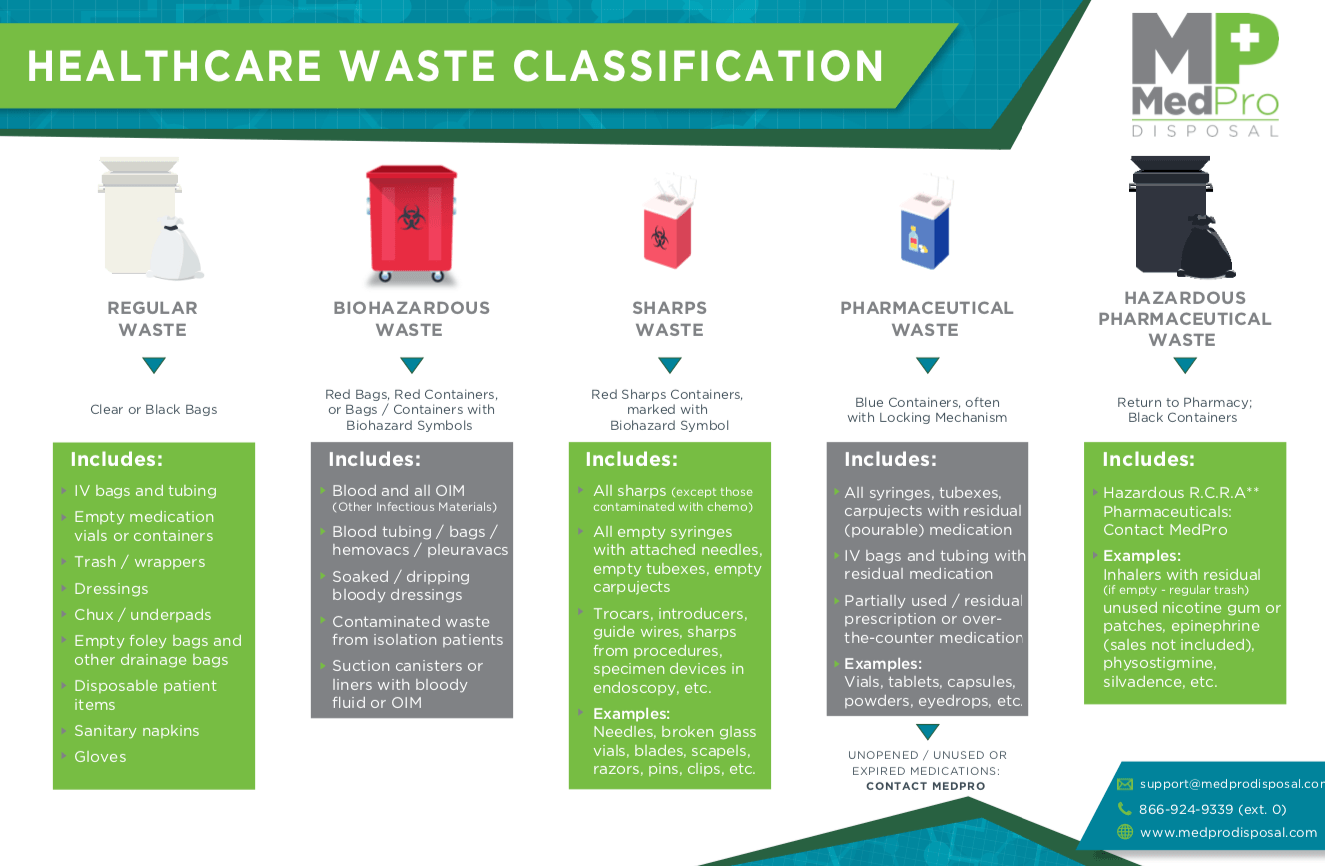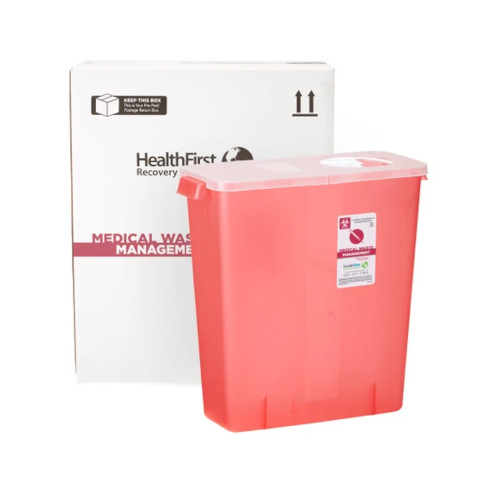Environmental Responsibility: The Eco-Friendly Approach to Medical Waste Disposal
Environmental Responsibility: The Eco-Friendly Approach to Medical Waste Disposal
Blog Article
The Value of Correct Garbage Disposal Practices
The management of waste is a crucial element of ecological stewardship that frequently goes undetected in our day-to-day lives. Correct garbage disposal practices are not simply a matter of ease but are crucial for guarding our ecosystems and public health and wellness. From the repercussions of incorrect garbage disposal on our environment to the long-term effects for future generations, the value of taking on sustainable waste monitoring methods can not be overstated. By discovering the environmental effect of careless garbage disposal, the benefits of recycling efforts, and the importance of neighborhood interaction in waste decrease initiatives, a deeper understanding of why appropriate waste disposal methods are important emerges.
Environmental Effect of Improper Disposal
Improper disposal of waste presents a considerable risk to the environment as a result of its harmful impacts on environments and human health. When waste is not effectively managed, it can cause air pollution of the dirt, water, and air, creating harm to different plant and pet varieties. click here. Chemicals and toxic substances from incorrectly disposed waste can leak right into the ground, contaminating groundwater sources and affecting the health of both wildlife and human beings
In addition, the build-up of waste in garbage dumps creates greenhouse gases like methane, adding to climate change and worldwide warming. Improper disposal techniques additionally cause littering, which not only deteriorates the visual value of the setting but can also harm wild animals through ingestion or entanglement.
To mitigate these ecological impacts, it is critical for areas and people to adopt appropriate garbage disposal practices such as reusing, composting, and accountable harmful waste disposal. By taking these steps, we can assist safeguard communities, protect all-natural sources, and safeguard human health and wellness for future and existing generations.
Advantages of Recycling Programs
Consistently joining reusing programs offers various benefits for both the atmosphere and culture overall. Among the essential benefits of recycling is the conservation of natural deposits. By reusing products such as paper, glass, metal, and plastic, much less resources need to be extracted from the planet, leading to lowered deforestation, mining, and boring activities. This preservation of sources not only assists in preserving environmental balance but additionally adds to lasting advancement.
Moreover, reusing plays a crucial duty in reducing energy intake and greenhouse gas discharges. The manufacturing of goods from recycled materials generally calls for much less power contrasted to producing from virgin resources - medical waste disposal. Consequently, the carbon footprint linked with the manufacturing procedure is substantially lowered, aiding in the fight against climate change
In addition, recycling programs develop job possibilities in the recycling sector, advertising economic growth and social welfare. By urging the recycling and reuse of materials, these programs support a round economic situation that minimizes waste generation and maximizes resource performance, eventually resulting in a cleaner, greener future for generations to find.
Hazardous Waste Monitoring Standards
Carrying out effective dangerous waste monitoring standards is vital for reducing environmental and wellness dangers related to the incorrect disposal of harmful products - click here. Proper handling, treatment, and disposal of contaminated materials are important to avoid contamination of soil, water resources, and air
One trick guideline is appropriate labeling of contaminated materials containers to guarantee risk-free handling and transportation. In addition, centers must abide by rigorous storage space needs to avoid leaks, spills, or mishaps that might endanger human health and the environment. Routine training programs for workers on contaminated materials administration practices are also crucial to ensure conformity with laws and advertise a culture of safety.
Moreover, contaminated materials needs to be segregated based Home Page on its residential properties to stop chain reactions that might cause unsafe situations. Implementing a thorough waste radar can assist keep an eye on the motion of hazardous materials from generation to disposal, making certain openness and responsibility. By adhering to these standards carefully, organizations and sectors can add to a much safer and cleaner environment for present and future generations.
Area Participation in Waste Reduction
To effectively deal with the ecological and health and wellness risks related to harmful waste administration, engaging the community in waste decrease efforts is vital. Neighborhood involvement plays an essential role in promoting sustainable waste administration techniques and promoting a society of environmental duty. By informing citizens concerning appropriate waste segregation, reusing, and composting strategies, neighborhoods can substantially reduce the amount of waste sent out to landfills, therefore reducing ecological contamination and saving natural deposits.
Area participation in waste decrease programs also aids in raising understanding about the relevance of waste reduction and motivates individuals to take on eco-friendly behaviors in their every day lives - medical waste disposal. Joint efforts in between regional authorities, waste management companies, and neighborhood participants can result in the application of reliable waste decrease techniques tailored to the specific needs of each community or town
In addition, community engagement promotes a feeling of ownership and responsibility amongst locals, encouraging them to take aggressive steps towards lowering waste generation and promoting a cleaner, healthier environment for future and existing generations. By functioning with each other towards usual waste reduction goals, areas can make a significant influence on alleviating the adverse impacts of improper waste disposal methods.

Future of Sustainable Waste Practices
Traditional waste disposal techniques, such as landfilling and incineration, are no longer lasting in the long term due to their significant ecological impacts. Relocating ahead, the future of sustainable waste methods lies in embracing a circular economic situation approach, where sources are reused, recycled, or repurposed to decrease waste generation.
Technological innovations play a key role fit the future of sustainable waste methods. Advanced waste sorting and recycling technologies can assist improve the effectiveness of waste monitoring procedures, permitting the recuperation of useful resources from waste streams. Furthermore, the adoption of eco-friendly products and composting approaches can aid reduce the quantity of natural waste finishing up in land fills, therefore mitigating greenhouse gas exhausts.
Furthermore, advertising consumer awareness and education and learning on proper waste segregation and disposal techniques is necessary for driving behavioral change towards sustainability. By cultivating a culture of waste reuse, recycling, and reduction, areas can jointly contribute to a cleaner and healthier environment for future generations.

Final Thought
To conclude, correct waste disposal methods are critical for minimizing ecological effect and promoting sustainability. By implementing reusing programs, taking care of contaminated materials properly, and motivating area involvement in waste decrease initiatives, we can work in the direction of a cleaner and much healthier setting. It is necessary for companies, people, and federal governments to prioritize sustainable waste practices for the future health of our earth.

From the consequences of inappropriate waste disposal on our setting to the long-lasting ramifications for future generations, the significance of taking on sustainable waste management methods can not be overemphasized. By checking out the environmental influence of reckless waste disposal, the advantages of recycling campaigns, and the significance of community interaction in waste decrease efforts, a much deeper understanding of why proper waste disposal methods are crucial arises.
By enlightening locals concerning appropriate waste segregation, reusing, and composting techniques, neighborhoods can substantially lower the amount of waste sent to landfills, therefore minimizing ecological contamination and conserving all-natural sources. (click here)
Moving forward, the future of sustainable waste practices exists in embracing a round economic climate approach, where resources are recycled, reused, or repurposed to decrease waste generation.
Advanced waste sorting and reusing innovations can help enhance the effectiveness of waste management processes, allowing for the recovery of beneficial sources from waste streams.
Report this page